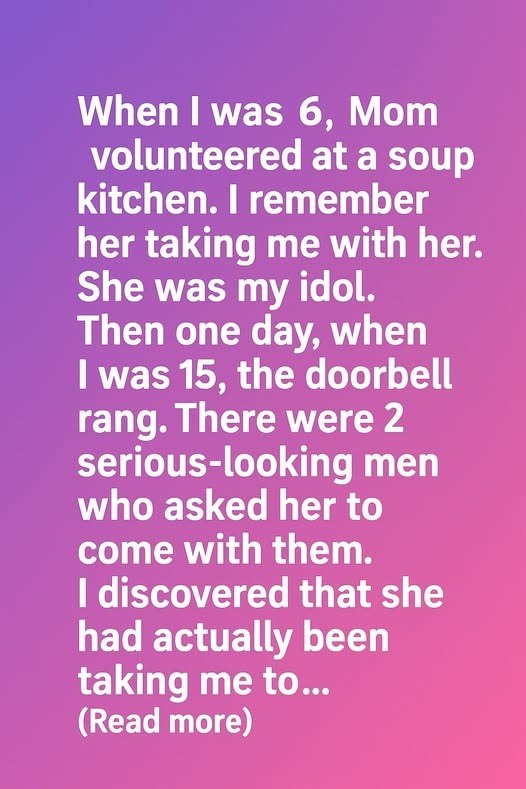
I remember her taking me by the hand as we walked through the bustling streets of our small town. The sidewalks were crowded with neighbors carrying groceries, kids chasing each other, and vendors calling out their specials. But I didn’t care about any of that. My whole focus was on her—my mom. She had this calm, steady way of moving through the world, like she carried a secret that made her both strong and gentle at the same time.
The kitchen where we always ended up was warm and filled with the comforting aroma of homemade bread and soup. Pots bubbled on the stove, filling the air with the scent of carrots, onions, and herbs. She told me we were there to help people who didn’t have enough to eat. At the time, that explanation made perfect sense to me. To my young mind, she was a hero, the kind of person who gave without ever asking for anything in return. She treated everyone who walked through those doors with kindness and dignity, always offering a smile that seemed to lift the weight off their shoulders. I wanted to be just like her.
This became our tradition. Every Saturday morning, no matter the weather, we made our way to what I knew as the “soup kitchen.” I would stand beside her as we ladled out steaming bowls of soup, passed around bread, and in the winter, handed out blankets. I felt an enormous sense of pride being at her side, watching her do what I believed was extraordinary work for the community. Those mornings were some of the happiest of my childhood.
But when I was 15, everything changed. One rainy afternoon, the doorbell rang. I rushed to open it, expecting a neighbor or maybe a delivery. Instead, two men stood on the porch. They looked serious, their expressions grave, their coats dripping with rain. One of them asked politely but firmly if my mom was home.
Before I could call for her, she appeared behind me. I’ll never forget the look on her face—it was pale, drawn, and yet strangely calm, as if she had been waiting for this moment. One of the men spoke softly but with authority: “Ma’am, we need you to come with us.”
My stomach dropped. Fear and confusion twisted inside me. “What’s going on?” I asked, my voice barely steady. The men exchanged a look before one of them crouched slightly so he was closer to my eye level. Gently, he explained that my mother had been under investigation for years—not because she had done something wrong, but because what she was doing was dangerous.
The world tilted as the truth spilled out. The place I had thought was a soup kitchen wasn’t just for the hungry. It was a shelter—but not for the homeless. My mom had been secretly helping women and children escape abusive and dangerous situations. Those bowls of soup and stacks of blankets were only part of the picture. The secrecy was deliberate, designed to keep both the families and our own family safe. And now, a dangerous group had discovered her work. For everyone’s protection, she and the families she had been sheltering needed to be relocated.
Tears blurred my vision as she wrapped me in the tightest hug I’d ever felt. “I wanted to teach you kindness without putting you in danger,” she whispered. “I never lied about helping people—I just couldn’t tell you everything.”
That day, I realized my mother was more than my idol. She was a quiet, fearless hero who risked everything to protect others. Even now, years later, I carry her lesson with me: true kindness often happens where no one is watching, and sometimes, the bravest acts are the ones carried out in silence.